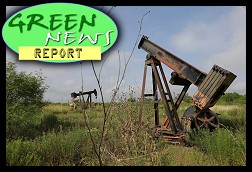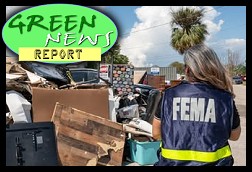Guest Blogged by John Gideon, of VotersUnite and VoteTrustUSA
 The "DVN Top 5" is a feature in the weekly voting newsletter of VoteTrustUSA. The March 27 edition can be found here. The selection of what will be the "Top 5" for each week and where it goes on the list is all mine. The fact that you may disagree with my choices is great because it shows that you have been reading the DVN articles that I've posted throughout the week here on The BRAD BLOG!...
The "DVN Top 5" is a feature in the weekly voting newsletter of VoteTrustUSA. The March 27 edition can be found here. The selection of what will be the "Top 5" for each week and where it goes on the list is all mine. The fact that you may disagree with my choices is great because it shows that you have been reading the DVN articles that I've posted throughout the week here on The BRAD BLOG!...
This week I find it impossible to make any of my "Top 5" the Number 1 story above any of the rest of the "Top 5" so they are all designated "Number 1". Pay no attention to the order in which they are posted; that's just the way they came up.
The main stream media seems to have finally decided that they may want to begin reporting about voting machine problems. It took a disaster in Illinois to wake them up, and that's the unfortunate thing. Things are so bad in Cook County and Chicago that one Alderman is quoted in the Chicago Tribune as saying, "It is an embarrassment. It is a disgrace. And until such time as we find out what caused all this, I don't think this firm should be paid." Meanwhile the Chicago Sun Times reported information about the voting machine vendor responsible for the primary election debacle, Sequoia Voting Systems, and their parent company, Smartmatic, a Venezuelan owned company with possible ties to Hugo Chavez.
Meanwhile in Emery County Utah another hero for the voting activist community has stepped forward as County Clerk Bruce Funk allowed Black Box Voting.Org to have access to two of his Diebold TSx machines On Monday he voiced his decision to resign his position rather than endorse an election using those machines. The county commission heard Bruce say that he resigned, though he never submitted a written statement, but by Tuesday he had changed his mind, according to the Salt Lake Tribune, and stated "I plan to fulfill the term of my office. I was elected to this position by the people of Emery County." While this was unfolding Diebold decided that the inspection done by the BBV folks had affected all of the counties machines which would require $40,000 worth of inspection. Funk vows to watch every step that Diebold makes, even to a point of video-taping, while the county commission says that he no longer has a job working for the voters. The lawyers will have to work all of this out and let's hope whatever is worked out the voters come out on top for a change. UtahCountVotes.org has actions we can all take to help Funk and ultimately, his voters.
Last Wednesday Florida Attorney General Charlie Crist surprised a lot of people as he subpoenaed the state's three voting systems vendors; Diebold, Sequoia, and ES&S; to answer questions regarding their sales practices in the state. In a media release Crist announced, "The Attorney General's Civil Rights Division will be assisting the Antitrust Division because of the importance of securing accessible voting systems for all Floridians. The subpoenas are seeking information about whether the companies agreed among themselves not to do business with the county." Also in question is whether the three companies colluded to not sell voting machines to Leon County as some kind of punishment for the actions of Ion Sancho.
Pennsylvania's voting systems examiner, Prof. Michael Shamos, performed pre-certification testing and inspection on the new Sequoia Advantage voting machines that are destined for use in some counties in the state. These machines are 10 year old machines that were used in Clark County, Nevada in the past. They have been refurbished by Sequoia and audio has been installed for use by voters who are blind or vision impaired. The inclusion of the audio caused a "bug" to be installed in the WinEDS software. That "bug" was reported to Sequoia, who was on site and it was immediately fixed. However, that "bug repair" caused more "bugs" to appear. Finally, Professor Shamos stopped the testing process and told Sequoia to get all of their problems fixed and return with a good product. It is important to note that all of these "fixes" must lead to a final WinEDS that must be federally qualified along with the rest of the Advantage system. It must also all meet the 2002 Voting Systems Standards and all of this has to happen in enough time for the state to certify the machines for use prior to the state's primary in May.
The arrogance of the voting machine vendors reared its ugly head this past week in counties across Texas with most of the reporting of this incident coming from Jefferson County. iVotronic voting machines manufactured by Elections Systems and Software (ES&S) were used in the Texas state primary last month and were due to be used in this months run-off elections. However, the machines performed so poorly in the primary that the counties demanded that ES&S repair the problems or the final payments for the machines would be withheld until they did make the fixes satisfactorily. Rather than work to satisfy their customers ES&S refused to do any work, including printing ballots and programming the machines for the upcoming run-off elections. The counties needed those services or they would be forced to use paper ballots so they found themselves between a rock and ES&S and they were finally squeezed into making the vendor happy. The Secretary of State's office was complicit in this strong-arming as they took the time to remind the county that if they did not have the machines ready they risked losing HAVA funds and risked being investigated by the DoJ for HAVA Section 301 violations.


 'Mob Boss' Trump's Global Trade Sanctions Tank U.S., World Markets: 'BradCast' 4/3/25
'Mob Boss' Trump's Global Trade Sanctions Tank U.S., World Markets: 'BradCast' 4/3/25 'Green News Report' 4/1/25
'Green News Report' 4/1/25
 Dems Step Up: Crawford Landslide in WI; Booker Makes History in U.S. Senate: 'BradCast' 4/2/25
Dems Step Up: Crawford Landslide in WI; Booker Makes History in U.S. Senate: 'BradCast' 4/2/25 Judge Dismisses Long-Running Challenge to GA's Unverifiable, Insecure E-Vote System: 'BradCast' 4/1/25
Judge Dismisses Long-Running Challenge to GA's Unverifiable, Insecure E-Vote System: 'BradCast' 4/1/25 'Green News Report' 4/1/25
'Green News Report' 4/1/25 Bad Court and Election News for Trump is Good News for America: 'BradCast' 3/31/25
Bad Court and Election News for Trump is Good News for America: 'BradCast' 3/31/25 Sunday 'Great Start!' Toons
Sunday 'Great Start!' Toons Vets Push Back at Trump, Musk Plan to Slash Health Care, 80K V.A. Jobs: 'BradCast' 3/27/25
Vets Push Back at Trump, Musk Plan to Slash Health Care, 80K V.A. Jobs: 'BradCast' 3/27/25 'Green News Report' 3/27/25
'Green News Report' 3/27/25 Signal Scandal Worsens for Trump, GOP; Big Dem Election Wins in PA: 'BradCast' 3/26
Signal Scandal Worsens for Trump, GOP; Big Dem Election Wins in PA: 'BradCast' 3/26 'Emptywheel' on Why Trump NatSec Team Should 'Resign in Disgrace' After Signal Chat Debacle: 'BradCast' 3/25/25
'Emptywheel' on Why Trump NatSec Team Should 'Resign in Disgrace' After Signal Chat Debacle: 'BradCast' 3/25/25 'Green News Report' 3/25/25
'Green News Report' 3/25/25 USPS 'Belongs to the People, Not the Billionaires': 'BradCast' 3/24/25
USPS 'Belongs to the People, Not the Billionaires': 'BradCast' 3/24/25 Sunday 'Suddenly Conceivable' Toons
Sunday 'Suddenly Conceivable' Toons 'Green News Report' 3/20/25
'Green News Report' 3/20/25 We're ALL Voice of America Now: 'BradCast' 3/20/25
We're ALL Voice of America Now: 'BradCast' 3/20/25 What Trump's 'Timber Production Expansion' Means (and Costs): 'BradCast' 3/19/25
What Trump's 'Timber Production Expansion' Means (and Costs): 'BradCast' 3/19/25 Courts Largely Holding Against Trump, Musk Lawlessness: 'BradCast' 3/18/25
Courts Largely Holding Against Trump, Musk Lawlessness: 'BradCast' 3/18/25 Chief VOA Reporter on Outlet Falling Silent First Time Since 1942: 'BradCast' 3/17/25
Chief VOA Reporter on Outlet Falling Silent First Time Since 1942: 'BradCast' 3/17/25 Trump EPA Unveils Plans to Endanger, Sicken Americans: 'BradCast' 3/13/25
Trump EPA Unveils Plans to Endanger, Sicken Americans: 'BradCast' 3/13/25 Trump Nixed Enforce-ment Against 100 Corp. Lawbreakers: 'BradCast' 3/12/25
Trump Nixed Enforce-ment Against 100 Corp. Lawbreakers: 'BradCast' 3/12/25 Bad Day for 'Strongmen': 'BradCast' 3/11
Bad Day for 'Strongmen': 'BradCast' 3/11 WI Election Could Flip Supreme Court Control, Musk Jumps In: 'BradCast' 3/10
WI Election Could Flip Supreme Court Control, Musk Jumps In: 'BradCast' 3/10
 VA GOP VOTER REG FRAUDSTER OFF HOOK
VA GOP VOTER REG FRAUDSTER OFF HOOK Criminal GOP Voter Registration Fraud Probe Expanding in VA
Criminal GOP Voter Registration Fraud Probe Expanding in VA DOJ PROBE SOUGHT AFTER VA ARREST
DOJ PROBE SOUGHT AFTER VA ARREST Arrest in VA: GOP Voter Reg Scandal Widens
Arrest in VA: GOP Voter Reg Scandal Widens ALL TOGETHER: ROVE, SPROUL, KOCHS, RNC
ALL TOGETHER: ROVE, SPROUL, KOCHS, RNC LATimes: RNC's 'Fired' Sproul Working for Repubs in 'as Many as 30 States'
LATimes: RNC's 'Fired' Sproul Working for Repubs in 'as Many as 30 States' 'Fired' Sproul Group 'Cloned', Still Working for Republicans in At Least 10 States
'Fired' Sproul Group 'Cloned', Still Working for Republicans in At Least 10 States FINALLY: FOX ON GOP REG FRAUD SCANDAL
FINALLY: FOX ON GOP REG FRAUD SCANDAL COLORADO FOLLOWS FLORIDA WITH GOP CRIMINAL INVESTIGATION
COLORADO FOLLOWS FLORIDA WITH GOP CRIMINAL INVESTIGATION CRIMINAL PROBE LAUNCHED INTO GOP VOTER REGISTRATION FRAUD SCANDAL IN FL
CRIMINAL PROBE LAUNCHED INTO GOP VOTER REGISTRATION FRAUD SCANDAL IN FL Brad Breaks PA Photo ID & GOP Registration Fraud Scandal News on Hartmann TV
Brad Breaks PA Photo ID & GOP Registration Fraud Scandal News on Hartmann TV  CAUGHT ON TAPE: COORDINATED NATIONWIDE GOP VOTER REG SCAM
CAUGHT ON TAPE: COORDINATED NATIONWIDE GOP VOTER REG SCAM CRIMINAL ELECTION FRAUD COMPLAINT FILED AGAINST GOP 'FRAUD' FIRM
CRIMINAL ELECTION FRAUD COMPLAINT FILED AGAINST GOP 'FRAUD' FIRM RICK SCOTT GETS ROLLED IN GOP REGISTRATION FRAUD SCANDAL
RICK SCOTT GETS ROLLED IN GOP REGISTRATION FRAUD SCANDAL VIDEO: Brad Breaks GOP Reg Fraud Scandal on Hartmann TV
VIDEO: Brad Breaks GOP Reg Fraud Scandal on Hartmann TV RNC FIRES NATIONAL VOTER REGISTRATION FIRM FOR FRAUD
RNC FIRES NATIONAL VOTER REGISTRATION FIRM FOR FRAUD EXCLUSIVE: Intvw w/ FL Official Who First Discovered GOP Reg Fraud
EXCLUSIVE: Intvw w/ FL Official Who First Discovered GOP Reg Fraud GOP REGISTRATION FRAUD FOUND IN FL
GOP REGISTRATION FRAUD FOUND IN FL


































